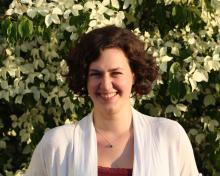“I’ve found that there’s a certain drive behind the academic and the search for research and compiling evidence and developing complexity and structures that I really like,” Holly Griffith, an undergraduate at the University of Washington studying Drama, told me during a recent conversation. The premise of our conversation? To congratulate Holly on winning the 2014 National Amy and Eric Burger Essays on Theatre Competition, and to discuss the research and coursework that led to her winning essay. We ended up chatting about much more.
Drama is, of course, also learning how to articulate complex concepts and topics, just in a different way and through a different medium.
What are you studying at UW, and what’s your involvement with the School of Drama, beyond taking classes?
I am a double-major in Drama, with a Performance emphasis, and Law, Societies, and Justice, with an interest in environmental policy work. I’ve gotten to do a couple of shows with the School of Drama. With UTS (the Undergraduate Theater Society), I’ve participated in Project Scorpion, The 39 Steps, and was the assistant set designer for A Map of Virtue. I was on the crew for The Real Inspector Hound and Reading to Vegetables.
Did you know, on coming to UW, what you wanted to study?
I’ve been an actor since I was in second grade. In high school I found a really intense passion for it, and decided that it was worth at least a try to see if I could do it professionally. I didn’t know about Law, Societies, and Justice (LSJ). I did a FIG – Freshman Interest Group – and took a class with Professor Herbert, head of LSJ. He introduced me to the subject. I took a couple more classes and found it was something that made me passionate.
How do LSJ and Drama intersect – in classes and in life?
LSJ is really founded and focused on reading and analyzing complex text and topics, and then learning to articulate your opinions and ideas based on what you’ve learned. Drama is, of course, also learning how to articulate complex concepts and topics, just in a different way and through a different medium. A lot of the language I use comes from the LSJ side of my education. The clarity of the way I use it – the way I present myself – a lot of that comes from Drama. Combining those two, it’s given me something to say and a way to say it.
Tell me a little bit about your essay, “Through the Lens of Apartheid: The Shifting of Perspectives for Sizwe Bansi is Dead.”
I looked at the venue, the acclaim, the director, the actors, and what the actors meant to the different time periods in South Africa (the original production during apartheid and the 2006 production). I was interested in the way that those concepts connected and became a very seamless audience experience, even though they were such different sets of circumstances. This phenomenological approach is a really neat way to analyze anything because you’re looking at the way that audiences experience work. Art is about experience. Art never happens in a vacuum. You can never fully understand a play unless you understand the audiences that it impacts.
Art is about experience. Art never happens in a vacuum. You can never fully understand a play unless you understand the audiences that it impacts.
What’s next for you at UW and beyond?
I really want to spend my next year exploring different options and then decide from there. I love acting and want to make sure that stays in my life. I would like to keep the academic going in my work, as well. I don’t think I’ll be satisfied without that sort of energy behind me. This summer I’m interning with Waste Management’s education outreach program. I’ll be going out and talking with communities, as well as facilitating meetings on how to better improve the message of sustainability.

